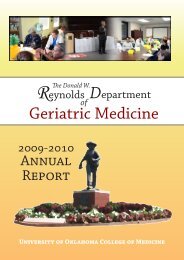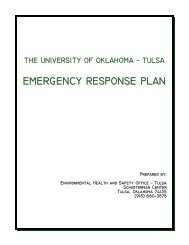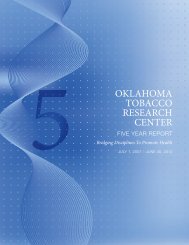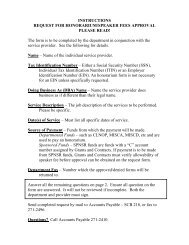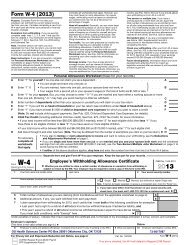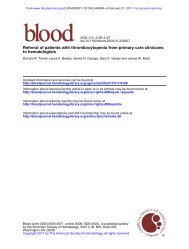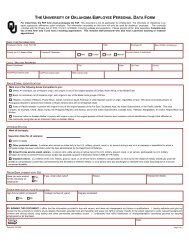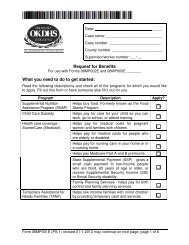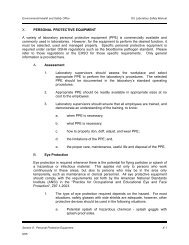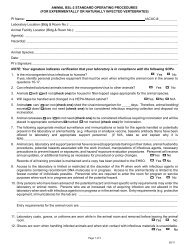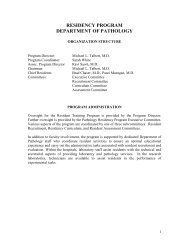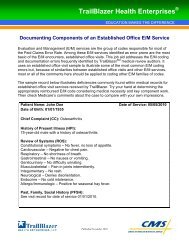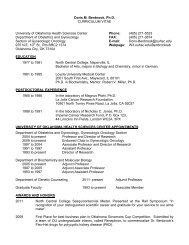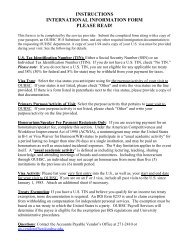The Unofficial Guide to First Year - University of Oklahoma Health ...
The Unofficial Guide to First Year - University of Oklahoma Health ...
The Unofficial Guide to First Year - University of Oklahoma Health ...
Create successful ePaper yourself
Turn your PDF publications into a flip-book with our unique Google optimized e-Paper software.
UNOFFICIAL GUIDE<br />
known <strong>to</strong> present information that you have not seen before. However, if you<br />
can figure out what concept he is testing, you can be certain that you have the<br />
correct answer. Some MS3’s also feel that Dr. Bidichandani’s questions are the<br />
most similar <strong>to</strong> what you will see on the USMLE. Pay attention <strong>to</strong> his review<br />
sessions - he does a thorough run-down <strong>of</strong> the material. It is worth going <strong>to</strong> Dr.<br />
Bidichandani’s class as he lectures extremely fast and tells some fascinating<br />
s<strong>to</strong>ries. He's is an awesome lecturer, but don't expect <strong>to</strong> play his lectures at<br />
double speed. He is speaks clearly but quite rapidly. He will also make it very<br />
clear what he wants you <strong>to</strong> know; this should reduce the syllabus by an amount<br />
making his material easy <strong>to</strong> review and cover. Many <strong>of</strong> our classmates <strong>to</strong>ok notes<br />
by simply circling the slides that he covered on the syllabus and crossing out<br />
those that he skipped. His syllabus will be the first <strong>of</strong> many where you will find<br />
an assortment <strong>of</strong> details that will not show up on the test. He welcomes<br />
questions from the class and is just a friendly guy.<br />
Dr. Broyles: Sickle cell anemia and regulation <strong>of</strong> genetic expression are his<br />
<strong>to</strong>pics. His lectures are not the best, so make sure you know his syllabus and you<br />
read the notegroups. Be particularly prepared <strong>to</strong> answer questions about the<br />
treatment <strong>of</strong> sickle cell anemia, the types <strong>of</strong> hemoglobin (especially fetal<br />
hemoglobin), and a couple rather difficult questions on hema<strong>to</strong>poeitic stem<br />
cells. Dr. Broyles thinks he is very special since he is a genetic mosaic, but you’ll<br />
be smart enough <strong>to</strong> tell him that so is every woman.<br />
Dr. Hanas: Our men<strong>to</strong>rs <strong>to</strong>ld us <strong>to</strong> know his syllabus. What really needs <strong>to</strong> be<br />
said is memorize his syllabus! He will ask you the most obscure details from his<br />
syllabus. If you look at something and say, "Oh, there definately won't be a<br />
question over this - it is much <strong>to</strong> obscure and inapplicable," it will<br />
proooooobably be one <strong>of</strong> his test questions. <strong>The</strong> material is deceptively simple,<br />
but he tests over details, details, and details. For the final, his exam questions<br />
didn’t seem so <strong>to</strong>ugh, but maybe that was because we learned our lesson the first<br />
time. Dr. Hanas has a <strong>to</strong>ugh act <strong>to</strong> follow, but you will begin <strong>to</strong> appreciate the set<br />
up <strong>of</strong> the syllabus if you learn it well. He practically puts his syllabus in definition<br />
format. By closely studying the syllabus, you will find that many <strong>of</strong> the pages will<br />
run <strong>to</strong>gether making the information easier <strong>to</strong> learn. Unless you are very<br />
compulsive about going <strong>to</strong> class, skip his lectures, they will not help you with the<br />
material (check notegroups carefully, however, as Dr. Hanas has been known <strong>to</strong><br />
ask exam questions based on his side-comments in lecture that are not in the<br />
syllabus). Dr. Hanas lectures with his eyes closed, no one knows why.<br />
Dr. DeAngelis: Proteins, enzymes, and blood coagulation, oh my! <strong>The</strong> material<br />
is dense, but you are not, and you’ll do just fine. A big point for the exam is that<br />
he asks questions in case-study format, where you’ll be given a patient and their<br />
53




